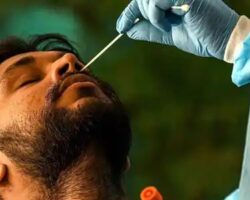A doctor at AIIMS issues a severe warning about three post-Covid symptoms. Read this.

Acute conditions that require prompt attention include brain attacks or strokes in arteries or veins, brain inflammation, Dr. from AIIMS said
An official from AIIMS Delhi warned that some indications of the disease, such as a brain attack or a stroke in the arteries, can be quite serious.
Following COVID, difficulties in the brain may arise, including inflammation in the brain as well as immediate acute conditions such a brain attack or stroke in the arteries or veins. There is currently no black-and-white image due to ongoing research, according to Prof. P Srivastava, Head of the Department of Neurology at AIIMS Delhi.
This occurs at a time when a recent study found that Long Covid affects approximately 144 million individuals globally. And roughly 10–20% of those who contracted the coronavirus really exhibit the protracted COVID symptoms.
This indicates that 4% of those who have contracted the virus may have Long Covid, albeit this number may actually be higher given the fact that many do not undergo Covid-19 testing.
The study has been conducted by a team Institute of Health Metrics and Evaluation by collecting data from 2021-22.
What is Long COVID?
Long COVID, according to the Centers for Disease Control and Prevention (CDC), is the occurrence of new, returning, or ongoing health problems 4 or more weeks after an initial infection with COVID-19. It is also known by other names, including post-acute COVID, post-COVID conditions, and chronic COVID.
What are the most common symptoms for long COVID?
Some of the common signs of the long COVID are Fever, Fatigue, Breathlessness, Cough, Chest pain, Brain fog, Sleep problems, Muscle pain, Pounding heartbeat, Loss of smell or taste, Depression or anxiety.
WHO has earlier notified that the disease can cause even severe disorders like vasculitis, heart and nerve-related ailments.
What are the treatments?
If you have been dealing with one of these illnesses for a while, you should see a doctor right away. The doctor may give you some medication and instruct you to do some gentle exercises to loosen up your muscles and joints.
Even if it hurts, don’t stay still because doing so will just make things worse.
Make a careful plan for your day and take part in a few mild activities.


